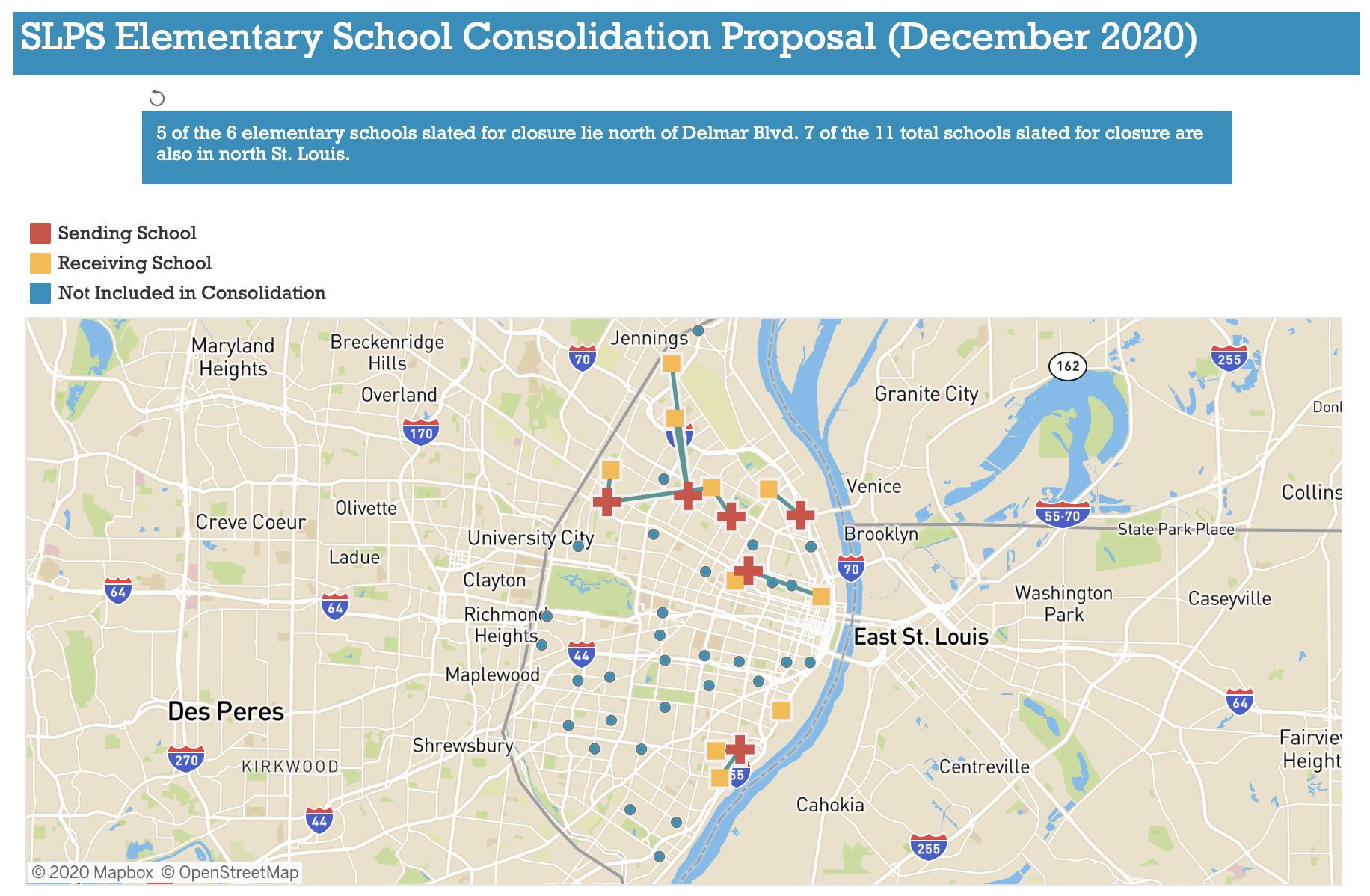FTF Statement on Proposed SLPS School Closures

Tuesday, December 15, 2020
Forward Through Ferguson adds its voice to the chorus of those calling for St. Louis Public Schools (SLPS) to delay its school consolidation vote in order to give a decision of this magnitude—a decision that will have disproportionate consequences for generations—the level of scrutiny, transparency, accountability, and community input that it merits. None of these crucial characteristics have been centered in this round or past rounds of school closures. Now is the time to change that pattern.
In the past few decades, SLPS has closed over 40 schools. Most of them have been in North City, disproportionately affecting Black students and neighborhoods. Over a hundred years ago, when St. Louis was the engine of an education revolution, many of those buildings were majestic brick structures built to inspire, standing physical commitments to and investments in urban education that could become a model approach throughout the country. Many of those buildings are now vacant. The current school closure plan is at direct odds with that aspiration and reinforces the effects of generations of systemic racism and neglect.

The purple circles and blue squares in the map above denote SLPS properties, mostly school buildings, that have been closed in the recent past. Most of them are in North city. Image credit: Jordan Brown. View on Tableau.
Here are some facts about the proposed plan according to our analysis:
- 7 of the 11 proposed closures are in North City
- Over 2000 Black students will be displaced compared to less than 100 White students
- Consolidation will affect over 1500 Black students in proposed receiving schools compared to under 50 White students
- 5 of the 9 proposed receiving schools perform worse on at least one indicator (math or English language arts) than the closing school according to 2019 data. 4 of them perform worse on both indicators.

The red crosses in the above map represent elementary schools proposed to close. The yellow squares are the proposed receiving elementary schools. The blue circles are other SLPS elementary schools. 5 of the 6 elementary schools proposed for closure are in north St. Louis. In the interactive visualization, hovering over consolidation schools shows the average 2019 MAP scores for them and the proposed receiving schools. Image credit: Cristian Vargas, Forward Through Ferguson Data Fellow.
Community outcry has voiced what most can intuit: displacing students by closing their schools is disruptive and damaging. Evidence confirms this—displaced students tend to fare worse unless they go to substantially higher performing schools and are provided with ongoing care and attention. As observed by WEPOWER and affirmed by our analyses, the schools proposed for closure are struggling. But so are the schools that would receive students from closing schools. The consolidation plan is titled “Building a Better St. Louis City School System.” But better for whom? The current plan further concentrates disadvantage. We implore SLPS leadership to listen to affected community; listen to logic; listen to evidence—the current plan is a recipe for failure that penalizes students, communities, and schools for circumstances that are beyond their control.
Dr. Adams reminded us that he and his colleagues in SLPS leadership “operate downstream from political forces that have divested themselves of our neighborhoods and our children.” This is true. As we explore in-depth in our Still Separate, Still Unequal project, a long history of policy decisions made in the interests of the wealthy and White have yielded a deeply racially and economically segregated landscape that has infected and catastrophically weakened our schools thanks to fundamentally inequitable school funding models. SLPS suffers year after year from this history and its toxic legacy.
But Dr. Adams’ words are only half true. The other half is this: SLPS remains the largest educator of Black students in the region—in the state for that matter. It is a major property owner in the city. Schools are anchors in their neighborhoods—weights that drag their communities down when buildings are left vacant and neglected or, when invested in, moorings that help their communities weather difficult times. In all of these ways, the decisions made by Dr. Adams and the SLPS Board directly and indirectly affect thousands of St. Louisans, disproportionately Black children and their families. Dr. Adams and the SLPS Board cannot shirk this responsibility.
Process matters. How hard decisions about closures are made matters. Who is in the room, the capacity of those individuals for racial equity and systems change, how data is used, how much time is given for feedback, how that feedback is used all matters. The quality of the process marks the difference between the will of a powerful few imposed on the many and the strength of a community coming together to make hard decisions together.
One of the Ferguson Commission’s signature priority calls to action was to apply a Racial Equity framework to new and existing regional policies by asking three simple questions:
- Whom does this benefit?
- Does this differentially impact some racial and ethnic groups?
- What is missing that will decrease or eliminate racial disparities?
It is clear that the SLPS consolidation plan does not withstand scrutiny through a Racial Equity Lens. It’s not too late to change that. With our eyes firmly set on the foundational reforms that are ultimately needed—and clear on the radical collaboration, awareness, and understanding that will be required—we join the call for St. Louis civic leaders to grow their Racial Equity and systems change capacity.
Forward Through Ferguson endorses WEPOWER, Dutchtown South CDC, and InvestSTL’s calls for the SLPS Board and leadership to postpone the consolidation vote. We strongly endorse the detailed next steps outlined by our partner organization WEPOWER to advance a more equitable, community-centered, and research-backed approach to the crisis SLPS and St. Louis families face.

#FwdThruFerguson